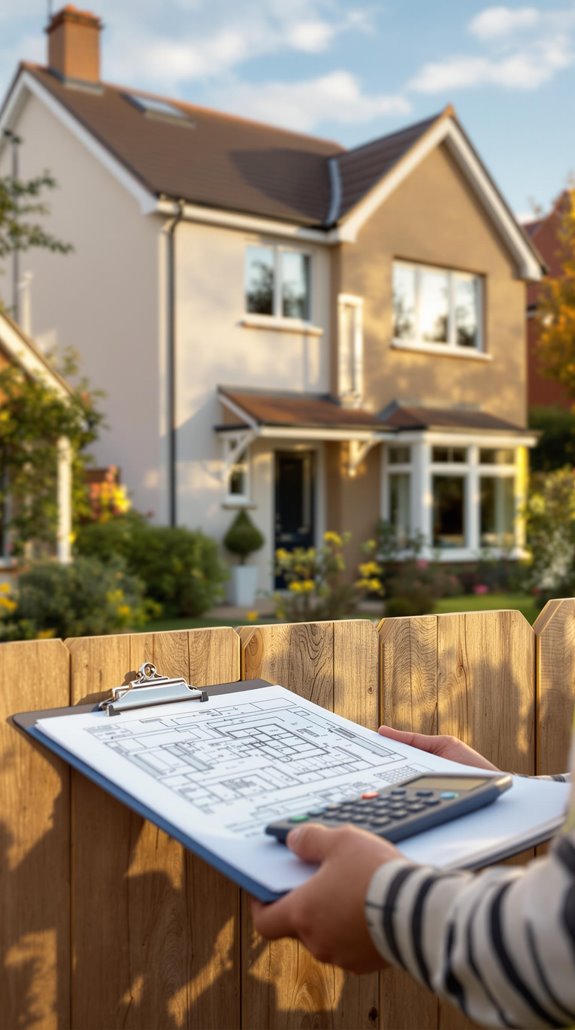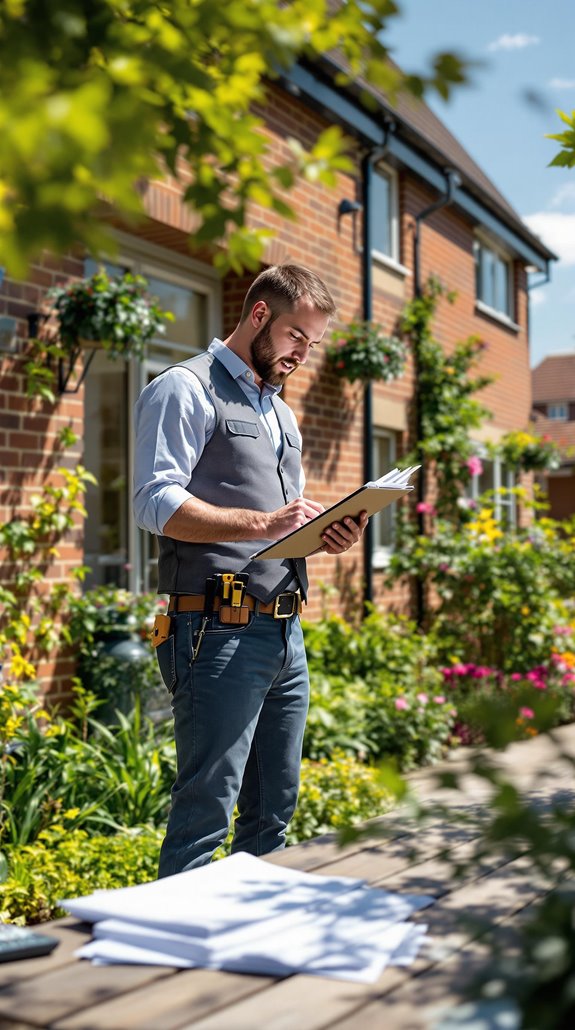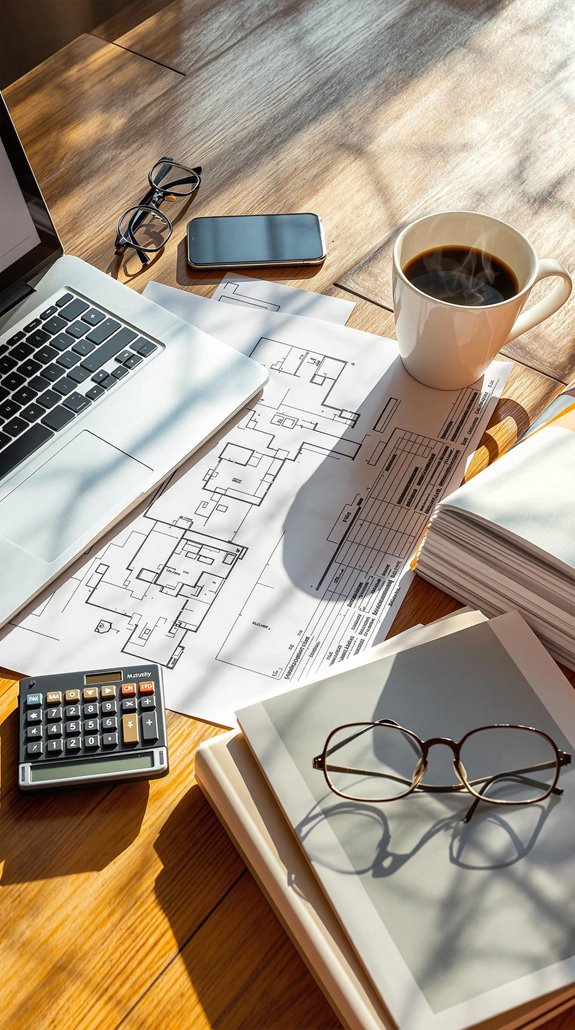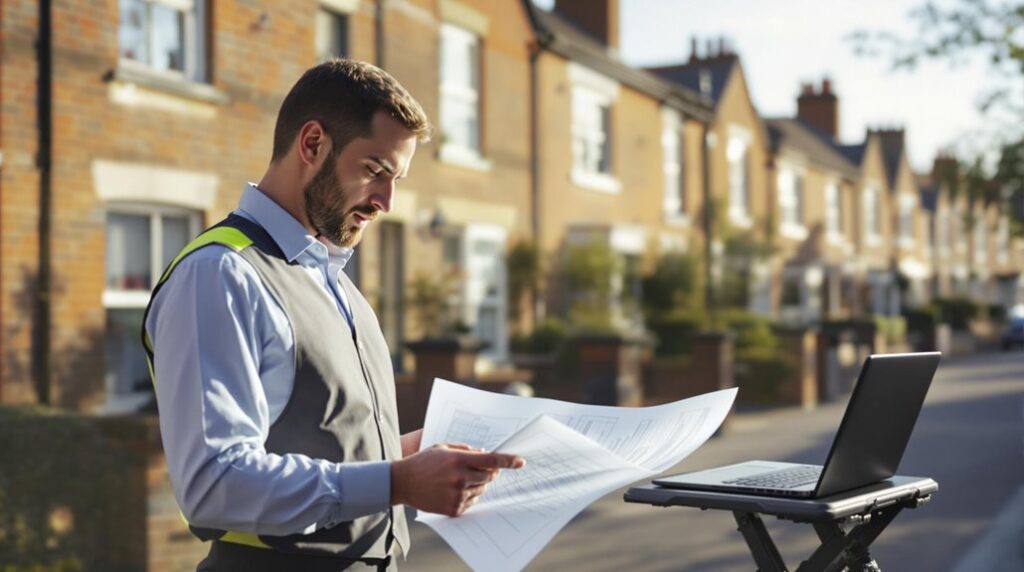I’ll break down the real costs of UK house surveys so you can make an informed decision without overspending. With prices ranging from £380 to over £1,000 depending on your property’s specifics, there’s significant variation in what you’ll actually pay. I’ve analyzed current market rates, surveyor fees, and the factors that drive costs up or down. Most homebuyers aren’t aware of the pricing strategies that can save them hundreds of pounds on this essential purchase.
Key Takeaways
- House surveys in the UK typically cost £380-£629, with most homebuyers spending around £500 on average.
- Level 2 surveys average £445 for visible defects, while Level 3 surveys cost £629 for structural analysis.
- Property value affects pricing: homes over £500,000 incur 25-40% higher fees due to increased investment risks.
- Get 3-5 quotes from RICS-accredited surveyors and choose local professionals who charge 10-15% less than national firms.
- Book during winter months for off-peak discounts and bundle with mortgage valuations to save money.
Average House Survey Costs in the UK for 2025

When you’re planning to purchase a property in the UK, understanding survey costs becomes essential for budgeting your home-buying expenses. In 2025, you’ll typically pay between £380 and £629 for a house survey, with most homebuyers spending around £500 on average.
The cost depends on which survey type you choose. Level 1 surveys (Condition Reports) start at £290 for properties under £100,000, while Level 2 surveys (HomeBuyer Reports) range from £480 to £800 based on property value. If you’re considering a Level 3 Building Survey, expect to pay between £600 and £1,500, with an average cost of £786. Conducting a property survey can help identify potential issues that may arise with the flat before you finalize your purchase.
Your final price will vary depending on your property’s value, location, and any additional investigations required during the survey process. Remember that higher fees don’t always guarantee superior service quality when selecting your surveyor.
Key Factors That Determine Your Survey Price
Several interconnected factors directly impact your house survey costs, with the type of survey you select serving as the primary price determinant. I’ll break down what affects your final quote so you can budget effectively.
Your property’s size greatly influences pricing – larger homes with 4+ bedrooms cost 20-50% more than flats, while each additional room adds £50-£150. Property value creates another premium layer, with homes over £500k commanding 25-40% higher fees due to investment risk assessments. Additionally, the risk of subsidence issues can further complicate assessments and increase costs.
Location matters considerably. London properties exceed national averages by 15-30%, while remote areas incur travel surcharges of £50-£200. Property condition also drives costs upward – pre-1900 homes cost 20% more, and severe disrepair requiring invasive testing adds £150-£400 to your bill. Professional surveyors must be accredited by accrediting bodies such as RICS, Sava, or RPSA to ensure standardized service quality.
Complete Cost Breakdown by Survey Level
Understanding these pricing factors prepares you for the specific costs you’ll encounter across each survey tier.
Level 1 surveys cost £300-£900 nationally, targeting newer properties needing basic surface inspections without valuation advice.
Level 2 surveys dominate the market—80% of homebuyers at average property values choose this option. You’ll pay £376-£550 for properties under £200k, scaling to £478-£757 for £500k-£600k homes. National averages sit between £400-£1000.
Level 3 surveys command premium pricing: £450-£699 for properties under £200k, jumping to £778-£1,436 for homes over £600k. Equipment surcharges add £100-£250.
I’ve found bundling with mortgage valuations saves up to 15%, while direct booking avoids 8-12% broker commissions. Fixed-fee quotes from 83% of providers eliminate surprise costs. Specialist surveys may be recommended following the initial inspection, adding further expenses to your overall survey budget.
How Property Value Affects Survey Pricing
Property value directly drives survey costs through a percentage-based pricing model that scales with your home’s market worth. I’ve found that surveyors typically charge 0.1-0.2% of your property’s value, meaning a £500,000 home costs considerably more to survey than a £200,000 flat.
You’ll notice fees increase markedly once your property exceeds £400,000. For properties worth £300,000-£500,000, expect to pay £600-£900 for a HomeBuyer Report. Above £500,000, you’re looking at £800-£1,200 for the same service. These fees contribute to the hidden costs of purchasing a home that buyers often overlook.
This pricing reflects the surveyor’s increased liability exposure and the more detailed inspection required for valuable properties. Higher-value homes often feature complex construction, premium materials, and sophisticated systems that demand expert evaluation. Your survey investment protects proportionally larger financial stakes. The comprehensive insights from these surveys can lead to price negotiations that potentially save buyers thousands of pounds.
Level 2 Vs Level 3 Survey Cost Comparison
Beyond property value considerations, you’ll face a fundamental choice between Level 2 and Level 3 surveys that directly impacts your budget. I’ve found Level 2 surveys average £445, while Level 3 surveys cost £629—that’s approximately 30% more you’ll pay for the thorough option.
The price difference reflects significant scope variations. Level 2 covers only visible defects, while Level 3 includes structural integrity analysis and investigates hidden issues. You’ll get 2-3 additional hours of inspection time with Level 3, plus specialist structural input that Level 2 excludes. Level 2 works best for newer homes in good condition, while Level 3 is the recommended choice for older properties. A detailed survey can help uncover hidden defects that could become costly repairs later on.
However, that £184 premium often pays for itself. Level 3’s detailed reporting prevents average £5,000 post-purchase repair surprises and provides negotiation leverage on defects. For most of us buying standard properties, this cost-benefit analysis makes Level 3 worthwhile insurance.
Why House Surveys Are Worth Every Penny
Although surveys require upfront investment, they consistently deliver returns that far exceed their cost through risk mitigation and financial protection. I’ve seen countless buyers save thousands by identifying structural defects, damp issues, and electrical problems before purchase completion. Additionally, a Building Survey provides a more detailed examination, which is crucial for identifying potential issues in older properties.
The survey becomes your negotiation weapon. When my surveyor found subsidence concerns, I renegotiated £8,000 off the purchase price. You’ll spot issues invisible during viewings, giving you leverage to request repairs or adjust offers accordingly.
Beyond immediate savings, surveys prevent expensive surprises later. That roof requiring replacement in five years? You’ll budget for it instead of facing emergency costs. The condition ratings provided help you plan maintenance schedules and replacement timelines effectively. Mortgage lenders often require surveys anyway, making the investment mandatory rather than optional for securing financing.
Money-Saving Tips for House Survey Costs

Smart buyers can slash survey costs by 30-50% through strategic planning and informed decision-making. I’ll share the insider tactics that seasoned property investors use to maximize value.
First, match your survey level precisely to your property’s risk profile. Don’t overpay for a Level 3 survey on a five-year-old new-build when a Level 1 will suffice. Book during winter months when surveyors offer off-peak discounts, as this can lead to significant cost savings.
Always request fixed-price quotes from 3-5 RICS-accredited surveyors using platforms like MyJobQuote. Local surveyors typically charge 10-15% less due to reduced travel costs. For properties under £200k, target Level 2 surveys at £376-£550, which is often the most economical option.
Bundle services strategically—combine mortgage valuations with surveys for discounted rates. Remember that most surveyors add 20% VAT to their quoted fees, so factor this into your budget calculations. Pre-pay to lock in current pricing and negotiate seller contributions during purchase agreements.
How to Get Competitive Quotes From Surveyors
When securing the best survey value, obtaining multiple competitive quotes separates savvy buyers from those who overpay by hundreds of pounds. I’ll request quotes from at least three RICS-registered surveyors, ensuring they’re comparing like-for-like services. Each quote should include a clear breakdown of costs, specifying what’s covered and any potential extras.
To expedite the process, it’s also beneficial to understand the typical selling timeline in the UK, as this can influence the urgency of the survey. I’ll be upfront about my budget constraints and ask about package deals that might include follow-up consultations. Smart buyers recognize that the cheapest option isn’t always best value—I’ll weigh expertise against price. When surveyors recommend additional investigations like structural assessments, I’ll get separate quotes for these services too.
Most importantly, I’ll factor potential additional costs into my budget from the start, avoiding nasty surprises that could derail my purchase. Shopping around can yield better deals for surveys, so I’ll take time to compare different surveyors thoroughly before making my final decision.
Budgeting for Your House Survey: What to Expect

Before diving into property viewings, I’ll need to allocate £400-£1,500 for a professional house survey—a critical expense that protects against potentially catastrophic financial surprises.
My budget should account for survey type selection based on property characteristics. Basic Home Condition Reports cost £400-£950 for newer properties, while thorough Building Surveys range £600-£1,500 for older homes requiring detailed analysis. Understanding the conveyancing fees involved in the sale can further enhance my financial planning.
Property value directly impacts costs—surveys for homes under £200,000 typically cost £376-£699, scaling upward for higher-valued properties. Location matters too, with London surveys commanding premium rates compared to rural areas.
I’ll factor in additional expenses like defect-specific inspections (£150-£300 extra) and potential follow-up surveys. The survey process typically takes 2 to 6 hours to complete depending on property size and complexity. This upfront investment prevents expensive post-purchase discoveries and strengthens my negotiating position when structural issues emerge.
Conclusion
I’ve shown you that house surveys cost £380-£629 on average, but you’ll get the best value by comparing quotes from three RICS-accredited surveyors. Don’t let the upfront cost deter you—a thorough survey can save thousands by identifying hidden defects before purchase. Budget around £500 for a standard property, factor in VAT, and consider winter bookings for better rates. Your investment in professional surveying expertise will pay dividends in avoiding costly surprises.
References
- https://www.myjobquote.co.uk/costs/surveying-a-house
- https://avrillo.co.uk/how-much-does-a-house-survey-cost-a-comprehensive-guide/
- https://sdlsurveying.co.uk/news/how-much-does-a-house-survey-cost-in-2025/
- https://wp.stolaf.edu/cila/files/2020/09/Teaching-at-Its-Best.pdf
- https://www.comparemymove.com/guides/surveying/how-much-does-a-house-survey-cost
- https://www.omniremovals.co.uk/blog/how-much-does-a-house-survey-cost/
- https://surveyhut.co.uk/level-2-or-3-home-survey/how-much-does-a-house-survey-cost/
- https://forums.moneysavingexpert.com/discussion/6355133/how-much-should-i-expect-to-pay-for-a-rics-survey
- https://www.surveyorlocal.co.uk/compare-surveys/house-survey-cost
- https://www.airtasker.com/uk/costs/house-surveyor/house-survey-cost/

